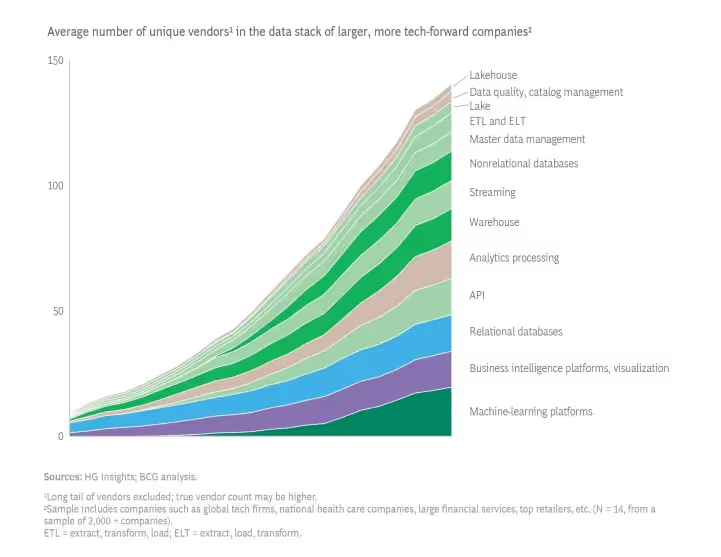Beyond the Data Complexity: Building Agile, Reusable Data Architectures
Lorem ipsum dolor sit amet, consectetur adipiscing elit. Suspendisse varius enim in eros elementum tristique. Duis cursus, mi quis viverra ornare, eros dolor interdum nulla, ut commodo diam libero vitae erat. Aenean faucibus nibh et justo cursus id rutrum lorem imperdiet. Nunc ut sem vitae risus tristique posuere.
.avif)
There's no denying the importance of data in today's business world. Done right, it is the backbone of organizational success, driving innovation, unlocking new revenue models, and delivering a competitive edge. However, data leaders worldwide are grappling with a challenging question: "Why aren't our data initiatives delivering the expected ROI?" This gap between anticipated outcomes and actual results is at the core of what we're terming the data stack crisis.
The Data Stack Crisis: A Complex Modern Data Landscape
The modern data landscape is far from the streamlined, efficient ecosystem many envisioned. Instead, it has evolved into a complex array of tools and technologies, each addressing a specific task. BCG research reveals a striking trend: the number of unique data vendors in large companies has nearly tripled over the past decade, growing from about 50 to 150. This dramatic increase in vendors hasn't led to the expected data revolution. Rather, it has created needlessly complex data architectures that are inflexible, resist change, and stifle innovation.

The Lack of Agility: A Critical Issue
At the heart of this crisis is a critical lack of agility. Organizations find themselves constrained by their technological choices, struggling to adapt quickly to evolving business needs. The data infrastructure, intended to accelerate innovation, has instead become a hindrance, impeding companies' ability to meet the demands for speed and flexibility in today's fast-paced business environment.
The limited reusability of data assets further exacerbates this agility challenge. Already operating at capacity, data teams often find themselves repeating efforts, rebuilding similar data pipelines and models for each new project. This inefficient cycle consumes valuable resources and leads to inconsistencies across the organization.
Consequences: Slow Insights and Missed Opportunities
The consequences of these challenges are stark: the journey from raw data to actionable insights has become excruciatingly long. Organizations are left waiting weeks, often months, for critical data-driven insights - an eternity in today's fast-paced business environment. By the time these insights are finally delivered, the market landscape has often shifted, rendering the data obsolete. This isn't just a minor inconvenience; it's a fundamental breakdown in the promise of data-driven decision-making. The lag cripples an organization's ability to respond to market changes, seize opportunities, or address emerging threats. In essence, the very tool meant to sharpen competitive edge is now blunting it.
The Scalability Crisis
Perhaps most alarmingly, this combination of limited agility and lack of reusability cripples an organization's ability to scale its data initiatives. As businesses grow and evolve, their data needs expand exponentially. Yet, data teams find themselves perpetually playing catch-up, struggling to meet immediate demands rather than building scalable, future-proof solutions. It's a recipe for stagnation in a business environment that demands constant evolution and growth.
The Cost of the Data Stack Crisis
The cost of this crisis extends far beyond the hefty price tags of cloud infrastructure and complex tool sets. The real cost lies in missed opportunities - the insights not uncovered, the innovations left on the table, and the competitive advantages squandered. In an era where data-driven companies are rewriting the rules of business, those trapped in the data stack crisis risk being left behind.
Even when organizations manage to navigate this complex terrain and implement sophisticated data tools, another challenge emerges in user adoption. Without adequate training and support, these powerful tools often go underutilized, failing to deliver on their promised value. It's a final, frustrating hurdle in the race to become truly data-driven.
.avif)
Reimagining Data Architecture: The Path Forward
To break free from this crisis, organizations must reimagine their data architecture with a laser focus on speed, agility, and reusability. The key lies in building a nimble data ecosystem that can pivot on a dime, adapting to new business needs as quickly as they arise. This means constructing data assets that aren't just flexible but are designed from the ground up to be repurposed and redeployed across various business functions at a moment's notice.
This shift towards an agile, reusable data infrastructure isn't just about enhancing efficiency—it's about transforming the very DNA of how organizations interact with their data. By prioritizing speed alongside flexibility, companies can dramatically reduce the time from data ingestion to actionable insight. This approach not only turbocharges decision-making processes but also fosters a culture of innovation where data-driven experiments and initiatives can be spun up, tested, and scaled with unprecedented rapidity.
As organizations grapple with these challenges, a new paradigm is emerging—one that promises to address the core issues of agility, speed, and reusability that have long plagued data initiatives. This approach draws inspiration from the world of software development, where modular design and reusable components have long been the norm. The key to unlocking the full potential of data lies in adopting a similar mindset: treating data not as a raw resource to be mined but as a product to be crafted, maintained, and continuously improved.
Enter Data Products: A Game-Changing Solution
Enter the concept of data products. Just as a well-designed software product can be easily adapted and scaled to meet changing needs, data products offer a way to package data assets in a form that's readily consumable, easily maintainable, and inherently reusable. This product-centric approach to data management forms the foundation of a more agile, efficient, and value-driven data ecosystem.
The Advantages of Data Products
By reimagining data through this lens, organizations can begin to break free from the constraints of their current data stack and build a more flexible, responsive infrastructure that can truly keep pace with the speed of business.
Data products are emerging as a game-changing solution to the challenges plaguing today's data stacks. This innovative approach reimagines how we handle data, transforming it from raw material into refined, ready-to-use assets that deliver immediate value.
At its core, a data product is a well-packaged unit of data designed to solve specific business problems. It's not just about the data itself; it's about creating a complete package that includes context, quality assurance, and accessibility features. Think of it as a high-quality, plug-and-play solution for your data needs.

This approach directly addresses the pain points many organizations face with their current data stacks. The agility that companies crave becomes built into the structure of these data products. Teams can quickly assemble and reassemble these modular data units, constructing solutions to business challenges with unprecedented speed and flexibility.
Scalability, a persistent headache for many data initiatives, becomes more manageable. With well-defined, self-contained data products, it's easier to identify bottlenecks and optimize performance. Organizations can scale specific data assets as needed without overhauling their entire data infrastructure.
Perhaps most importantly, the data product approach rebuilds trust in data across the organization. Each data product comes with clear lineage information - a transparent history of its origin, processing, and purpose. This clarity instills confidence in users at all levels, from executives to front-line staff, enabling more assured, data-driven decision-making.
The chronic lack of reusability that has led to countless hours of duplicated effort starts to disappear. Data products are designed from the ground up to be reusable across multiple use cases, promoting consistency and efficiency throughout the organization.
Even governance and compliance issues become more straightforward. With clearly defined ownership, access controls, and usage policies built into each data product, maintaining compliance and ensuring proper data handling becomes less of a burden and more of a standard procedure.

As for the adoption struggles that have plagued many data initiatives? The data product approach, with its focus on user experience and clear documentation, makes data more accessible than ever. Users no longer need to be data scientists to derive value from the organization's data assets.
In essence, the data product concept offers a path to transform data from a cost center into a strategic asset. It aligns data management more closely with business needs, enabling faster, more reliable insights. As organizations embrace this approach, they're building a more coherent, efficient, and value-driven data ecosystem – one that's capable of not just keeping pace with the speed of business but actually driving innovation and competitive advantage.
While the transition to a data product approach does require investment in new skills and technologies, the potential rewards are substantial. For organizations willing to make this shift, it's not just about having a more efficient data stack - it's about gaining a true competitive edge in an increasingly data-driven world.



